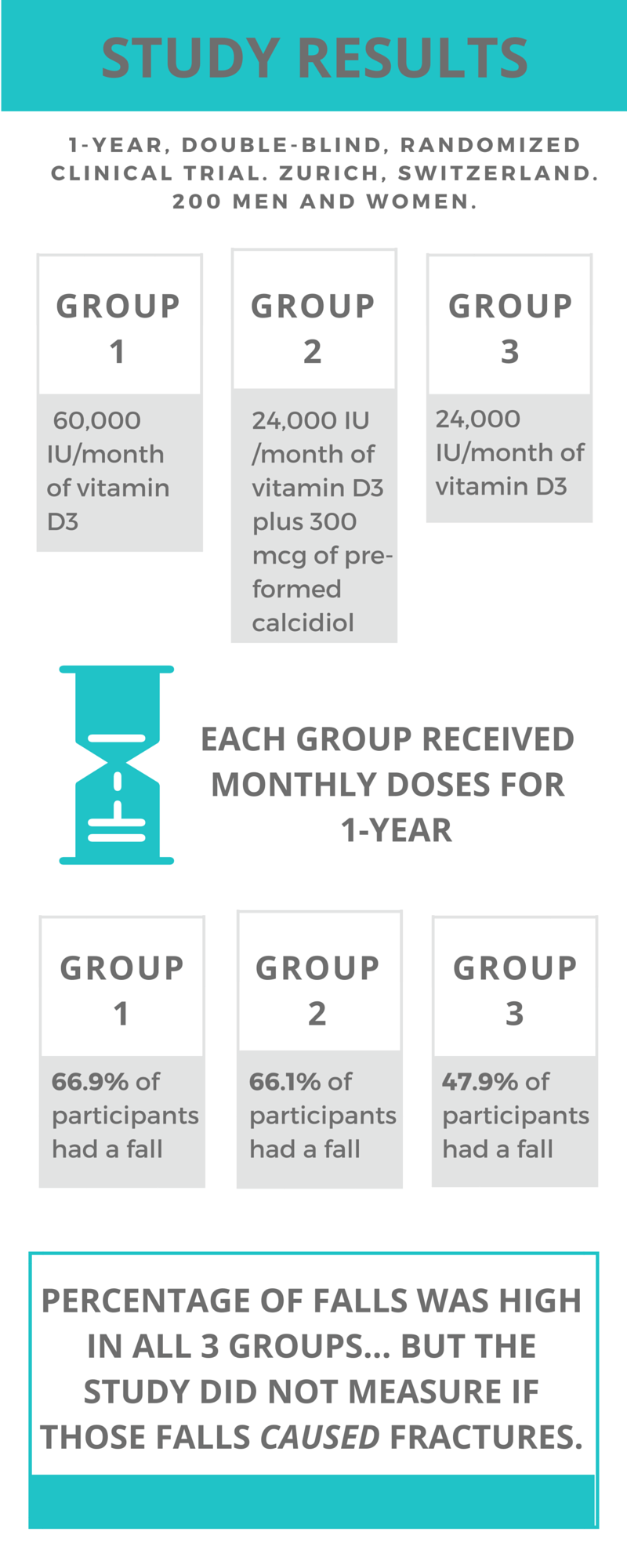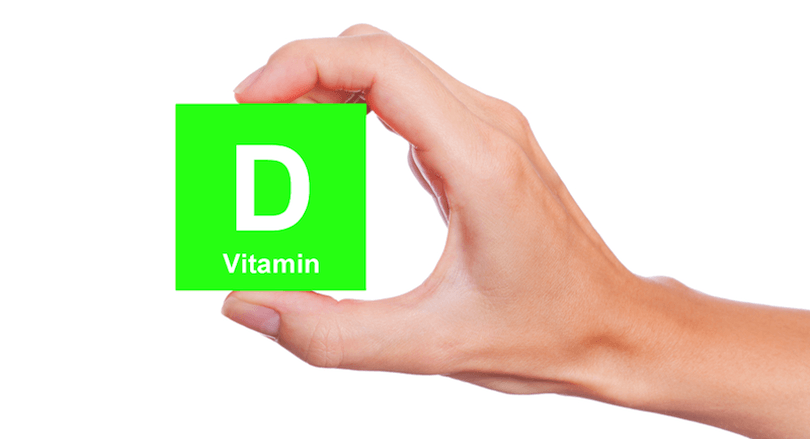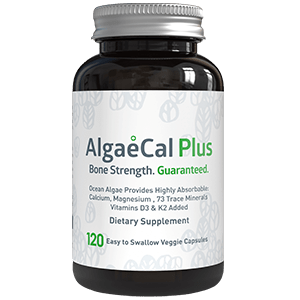A new vitamin D study published in The Journal of the American Medical Association (JAMA), has revealed that vitamin D does not reduce your risk of falling.¹
In fact, it may increase it!
At least that’s what it seems like on the surface…
What The Study Found When It Came to Falls
 This one-year, double-blind, randomized clinical trial, conducted in Zurich, Switzerland, included 200 men and women.
This one-year, double-blind, randomized clinical trial, conducted in Zurich, Switzerland, included 200 men and women.
There were three study groups with monthly treatments of vitamin D3:
- The high-dose group received 60,000 IU/month of vitamin D3.
- The middle-dose group received 24,000 IU/month of vitamin D3, plus 300 mcg of pre-formed calcidiol. (This is the form of vitamin D3 after activation in the liver. This makes it 5 times more potent than D3, but still not in its final hormonally active form)
- The low-dose group received 24,000 IU/month of vitamin D3.
These participants were given monthly doses. A number of studies have shown that monthly dosing is not as effective as daily, which I will explain below. But first, let’s see the results…
At the end of this one-year study, incidence of falls was found to have differed among the groups:
- In the 60 000 IU group, 66.9% of participants had a fall.
- In the 24 000 IU plus calcidiol group, 66.1% of participants had a fall.
- In the 24 000 IU group, 47.9% of participants participants had a fall.
As you can see, the percentage of falls was quite high. But that’s not a surprise.
The mean age of the participants was 78. Their muscle mass was VERY low. They were highly sarcopenic. And they all experienced a fall before.
I’ll note that 200 people is a pretty small sample size for a trial where they are measuring falls. Also, participants were 70 years and older, in a nursing home setting which is not the same as free living environment. So, in my mind this study’s results should not be taken too seriously.
But what the study did not measure, is whether or not those falls caused fractures.
What The Study Didn’t Show
The study results showed the incidence of falls was high after monthly vitamin D supplementation – for all groups.
But what the study didn’t show was whether or not those falls caused fractures.
Why is this important?
A different trial of 2,686 seniors 65 to 85 years old, were given 100,000 IU of vitamin D3 once every 4 months for 5 years. ² The results showed the dose of vitamin D3 did not reduce the risk of falling, but it significantly reduced the risk of any new fracture by 22%!
So to say that vitamin D may not reduce falls may be correct. But it’s not the falling that really matters. It’s whether or not you fracture a bone due to a fall – and it seems like vitamin D reduces that risk.

How Much Vitamin D Do You Need and Why You Should Supplement Daily
75% of Americans are vitamin D deficient.³ Chances are, you are too.
Experts like Lara Pizzorno, Dr. Heaney and The Vitamin D Council all agree that the current recommendations are too low. The Institute of Medicine recommends just 800 IU of vitamin D3 per day and the Endocrine Society recommends 2000 IU per day for adults.
That’s what this study gave participants in the highest group: 60,000 IU monthly, or if you worked it out to a daily amount, about 2000 IU. This is not enough for the average adult.
The Vitamin D Council recommends the average adult get 5000 IU of vitamin D3 per day.⁴ (Keep in mind this is for all sources: sunlight, diet and supplementation).
So What’s The Take Home Message?
You should supplement daily.
It seems to be more effective.
Research shows that studies in which bolus dosing (weekly, monthly etc.) is used, results are mixed at best. But in studies where daily dosing is used, results are more consistent and good.
 The reason why is still unclear, but it may be due to less regular absorption in the gut.
The reason why is still unclear, but it may be due to less regular absorption in the gut.
On a different note – most people simply don’t supplement using weekly or monthly dosing. Daily supplementation makes the most sense for most people. For ease and compliance.
To find out what is optimal for YOU and not just the average adult, you need to get tested. Ask your doctor for a 25(OH)D or 25-hydroxyvitamin D test. It is the best and most reliable way to found out your optimal vitamin D needs to reduce your risk of fracture.
AlgaeCal Plus provides 1600 IU of vitamin D3 in a daily dose. To find out how much vitamin D3 you need for optimal benefits, get tested.
Sources:
- Bischoff-Ferrari HA, Dawson-Hughes B, Orav E, et al. Monthly High-Dose Vitamin D Treatment for the Prevention of Functional Decline: A Randomized Clinical Trial. JAMA Intern Med. Published online January 04, 2016. doi:10.1001/jamainternmed.2015.7148.
- Ginde AA, Liu MC, Camargo CA, Jr. Demographic Differences and Trends of Vitamin D Insufficiency in the US Population, 1988-2004. Arch Intern Med. 2009;169(6):626-632. doi:10.1001/archinternmed.2008.604.
- https://www.vitamindcouncil.org/blog/why-does-the-vitamin-d-council-recommend-5000-iuday/





Article Comments